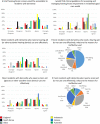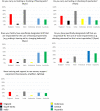Hearing and vision health for people with dementia in residential long term care: Knowledge, attitudes and practice in England, South Korea, India, Greece, Indonesia and Australia
- PMID: 33929059
- PMCID: PMC8518517
- DOI: 10.1002/gps.5563
Hearing and vision health for people with dementia in residential long term care: Knowledge, attitudes and practice in England, South Korea, India, Greece, Indonesia and Australia
Abstract
Objectives: Up to 90% of people with dementia in long term care (LTC) have hearing and/or vision impairment. Hearing/vision difficulties are frequently under-recognised or incompletely managed. The impacts of hearing/vision impairment include more rapid cognitive decline, behavioural disturbances, reduced quality of life, and greater care burden. This research investigated LTC staff knowledge, attitudes and practice regarding hearing/vision care needs for residents with dementia.
Methods: A survey of staff in LTC facilities in England, South Korea, India, Greece, Indonesia and Australia. Respondents used a five-point scale to indicate agreement or YES/NO response to questions regarding sensory-cognitive care knowledge (what is known); attitudes (what is thought); practice (what is done).
Results: Respondents reported high awareness of hearing/vision care needs, although awareness of how to identify hearing/vison difficulties or refer for assessment was low. Most felt that residents were not able to use hearing/vision devices effectively due to poor fit, being poorly tolerated or lost or broken devices. A substantial minority of respondents reported low confidence in supporting use of assistive hearing/vision devices, with lack of training the main reason. Most staff did not undertake routine checking of hearing/vision devices, and it was rare for facilities to have designated staff responsible for sensory needs. Variation among countries was not significant after accounting for staff experience and having received dementia training.
Conclusions: There is a need to improve sensory support for people with dementia in LTC facilities internationally. Practice guidelines and training to enhance sensory-cognitive knowledge, attitudes and practice in professional care teams is called for.
Keywords: KAPsurvey; LTC; dementia; nursing home; shearing care; staff training; vision care.
© 2021 The Authors. International Journal of Geriatric Psychiatry published by John Wiley & Sons Ltd.
Conflict of interest statement
None.
Figures





References
-
- Jupiter T. Cognition and screening for hearing loss in nursing home residents. J Am Med Dir Assoc. 2012;13(8):744‐747. - PubMed
-
- Bowen M, Edgar DF, Hancock B, et al. The Prevalence of Visual Impairment in People with Dementia (The PrOVIDe Study): A Cross Sectional Study of 60‐89 Year Old People with Dementia and Qualitative Exploration of Individual, Carer and Professional Perspectives. Southampton, UK: National Institute of Health Research; 2016. - PubMed
-
- Resnick HE, Fries BE, Verbrugge LM. Windows to their world: the effect of sensory impairments on social engagement and activity time in nursing home residents. J Gerontol Ser B Psychol Sci Soc Sci. 1997;52B(3):S135‐S144. - PubMed
Publication types
MeSH terms
LinkOut - more resources
Full Text Sources
Other Literature Sources
Medical

